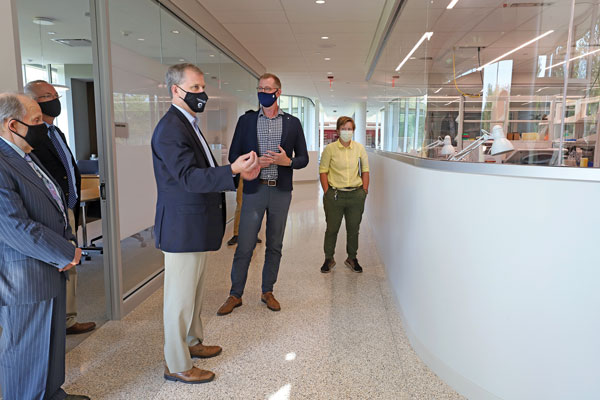10/1/2021
A Congressman Comes for a Visit
Jennifer Zurko

In early September, Congressman Sean Casten (IL-6) paid a visit to Ball Horticultural Company’s headquarters in West Chicago. Dr. Marvin Miller, Ball’s market researcher manager and our industry’s hortistician, said the goal was to introduce the congressman to the company and talk about current legislative issues affecting the company and the industry.
“We always believe it important that our elected officials know who we are as a company and as individuals, so that they can do their best job representing us,” Marvin explained. “And when we have those face-to-face conversations, it allows us to add our customers’ concerns to their agendas as well.”
Pictured: Congressman Sean Casten (middle) getting a tour of the new Ball Helix research and pathology labs.
A handful of Ball executives sat with Mr. Casten to talk about a number of different issues, including the need for a reliable seasonal workforce for growers and thanking him for supporting the Farm Workers Modernization Act (which passed the House in March); the tariffs affecting seed imports from around the world, especially from China; the increased pressure for compliance and regulations on importing and exporting seed (the rise of concerns surrounding GMOs and the United Nations’ focus on plant and seed health has put the seed industry on regulators’ radar); and the need for continued support for floriculture research.
Mr. Casten also spoke about the latest legislation he’s been working on that centers around the economics of climate change. A former entrepreneur who owned a clean energy business, Mr. Casten serves on the Energy and Environment subcommittees in the House, and is on the House Science, Space and Technology Committee, so climate and sustainability are some of his primary focal points.
After the meeting, Ball CTO Matt Mouw took the congressman on a tour of the new Ball Helix research and pathology labs. (As a science-y guy, Mr. Casten was very engaged and asked a lot of questions. One of his aides joked that she wouldn’t be able to tear him away.) And the beautiful weather also allowed for a quick tour through the Ball Gardens and a way for Anna and Susannah Ball to talk about the background of the company.
Although Ball’s headquarters isn’t technically in Mr. Casten’s district—Congresswoman Lauren Underwood (IL-14) is actually the one who represents the area—the town of West Chicago is split between Mr. Casten and Ms. Underwood, and could change after the district maps are redrawn, which is happening right now. (Illinois lost one House seat based on the results of the 2020 Census.)
Regardless, the congressman is still relatively new (he was elected to a second term in 2020, so he’s only been in Congress for three years). And his proximity to Ball, plus his science and business background, offered the company a great opportunity to have a formal meet-and-greet with one of Illinois’ policymakers.
“Regardless of party affiliation or district lines, whenever you have a chance to meet a legislator and talk about issues important to horticulture, do it!” said Anna. —JZ
H-2A Wage Rule in the Works
A Biden administration H-2A visa program wage final rule is making its way through the regulatory clearance process. Currently, it’s at the White House, which has up to 90 days to review it. As you may recall, the Trump administration had initiated H-2A rule changes in July of 2019. A wage-specific final rule was published in November 2020, but was blocked by a federal judge and then caught up in a broader regulatory review as the new administration took over. Other aspects of the original rulemaking weren’t finished before the change in administrations took place.
Though specifics of the rule aren’t available, we expect a final rule may feature some concerning wage provisions first proposed by the Trump administration in July 2019. Most notably, a final rule may require specific adverse effect wage rates (AEWRs) for specific occupational duties, such as haulers/truck drivers, on-farm construction and first-line supervisors—changes that could make the H-2A program even more costly.
The House-passed Farm Workforce Modernization Act (FWMA) included some of the wage provisions initially proposed during the Trump administration, but would link the wage determination to the primary duty performed. FWMA also featured a one-year pause on a wage increase and limits on how much the H-2A AEWR can rise in any given year. In short, bipartisan legislation would bring the prospect of some relief.
— Craig Regelbrugge, VP of Government Relations & Research, AmericanHort
Employer Vaccine Mandate Questions Answered
Since the FDA’s full approval of the two-dose Pfizer vaccine for folks 16 and over, communities, local governments and businesses throughout the country have been issuing vaccine mandates (or opting for the weekly COVID-19 testing) for employees of educational, governmental and business settings. This has been encouraged by President Biden (who signed an executive order in September requiring businesses with 100 or more employees to require vaccines or get tested weekly), but also has been the plan for organizations who’ve had a “let’s wait for official approval before requiring a jab” policy.
Both American-Hort and SAF have released vaccine-related news items spurred by the official approval of the Pfizer shot. If you’re a member of either organization, you can access all of the information at: tinyurl.com/AHVaccineFAQ and tinyurl.com/SAFVaccineFAQ.
—Ellen C. Wells